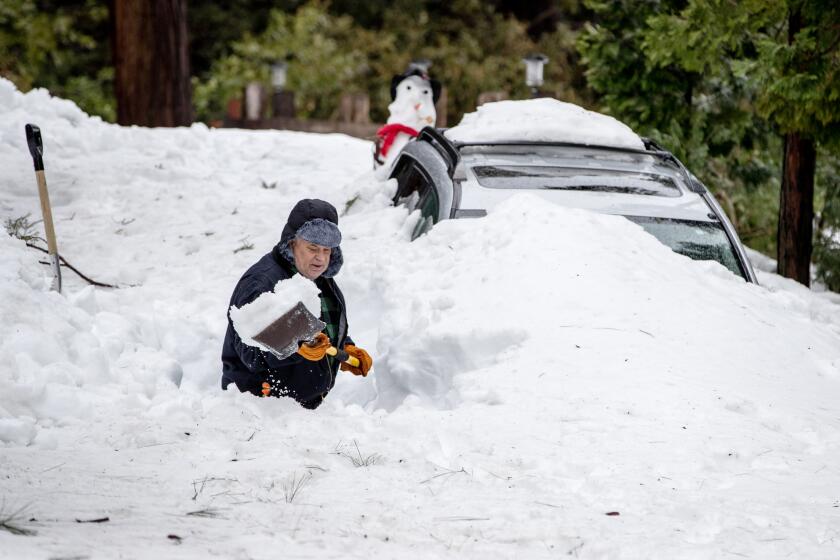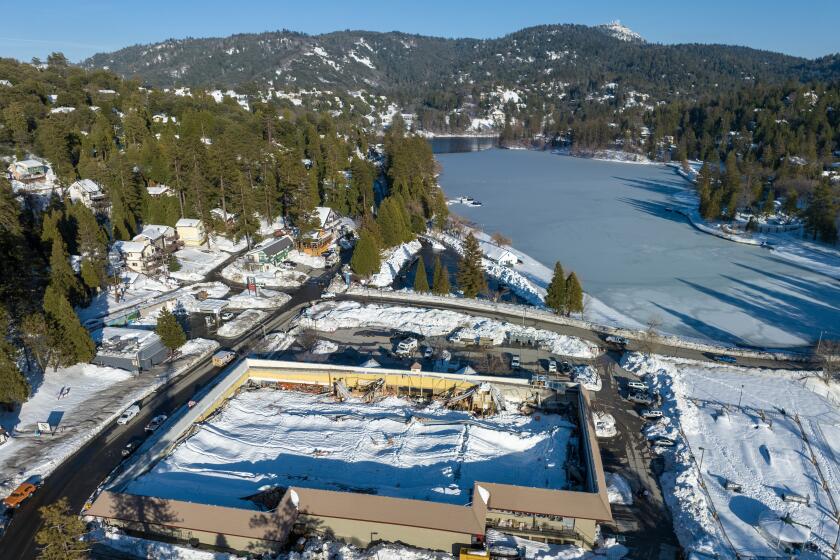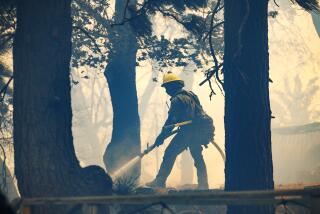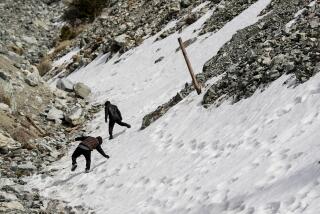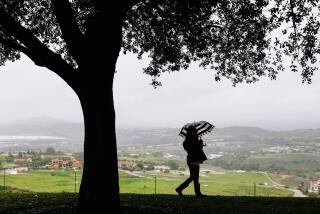Deaths climb to 13 after San Bernardino snowstorms
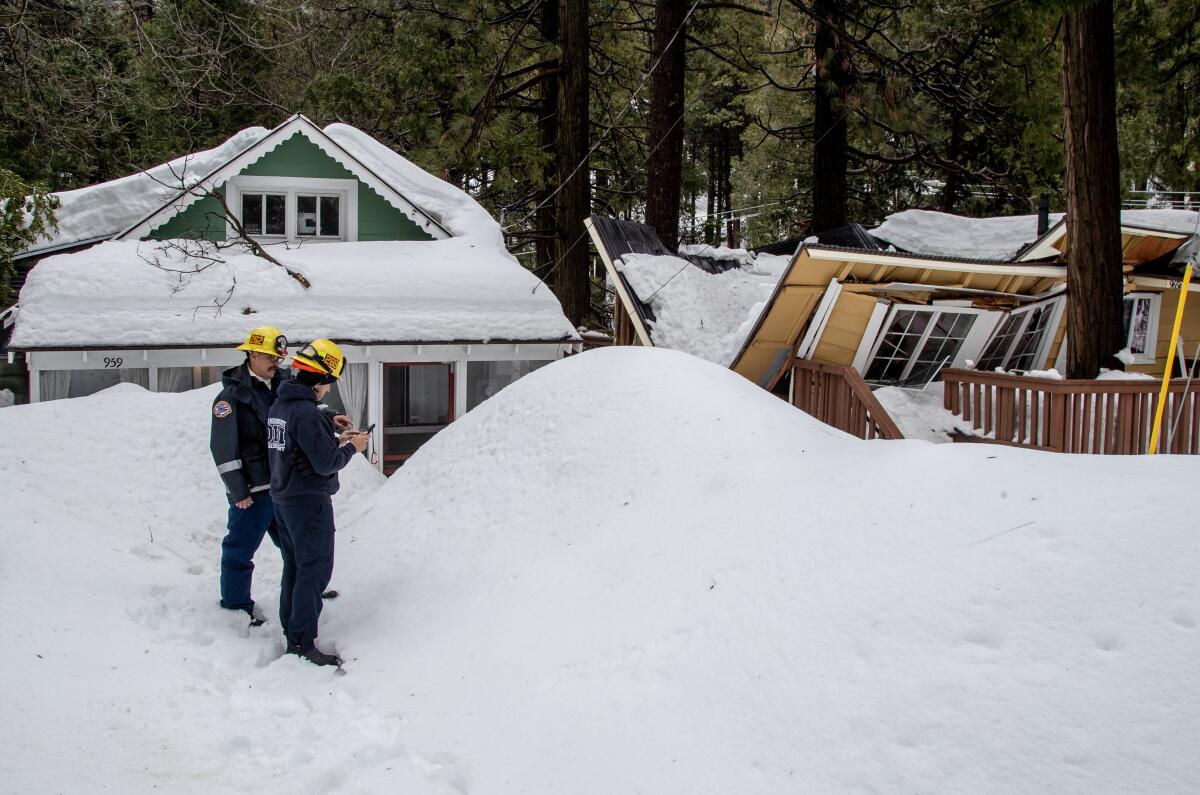
More than a dozen people have died in San Bernardino County’s mountain communities in the wake of back-to-back snowstorms that dumped historic amounts of snow — more than 100 inches in places — stranding many in their homes for two weeks, county officials said.
The San Bernardino County Sheriff’s Department said Thursday it has responded to 13 deaths since Feb. 23, though investigators have determined that only one had a “direct correlation to the weather,” according to a news release. That person died at a hospital after a car crash during the storm.
Four were people who either died at a hospital or were in hospice, officials said, and therefore will not be investigated. The rest are under investigation by the coroner’s division of the Sheriff’s Department.
“The preliminary information we have at this time is the circumstances observed at the scenes did not present as weather-related,” according to a statement from the agency. “Many of the deceased had significant medical histories or chronic conditions.”
Sheriff’s officials released limited information for the nine deaths not linked to hospitals or hospice care and reiterated that investigators do not believe the weather or a lack of food or resources contributed to any, calling them “natural.” However, no cause of death has been determined in any of them.
But residents in mountain communities who spoke with The Times pushed back on that notion, saying many were stranded without food, electricity, heat and medications for days, if not weeks — extremely stressful conditions they believe contributed to, if not caused, the casualties.
Why is it taking so long to help stranded residents in the San Bernardino Mountains?
Crestline resident Liberty Guerrero said she knows three people — all of them elderly — who died in the last week. She said the nearby Cedarpines Park community “is a big elderly community. They live in the boonies, and nobody’s gone there yet.”
“They’re going to find more [dead],” Guerrero said.
The first death — the one sheriff’s officials said had a “direct correlation to the weather” — was a 39-year-old woman killed Feb. 26 after being struck by a vehicle in Fawnskin, officials said. That incident matches the story of Barbie Hughes, whose family said she was killed while trying to help someone stuck in the snow.
Two days later — as the second of two brutal snowstorms began to wane — a 65-year-old woman living on Irene Street in Wrightwood was found dead by a neighbor, according to the Sheriff’s Department. While she had no known medical issues, sheriff’s officials said she had complained of “flu-like symptoms.” She was last known to be alive the previous day.
On March 2, a 77-year-old woman was found dead by her landlord on Zell Court in Crestline. She was last seen by her landlord the week before, deputies said. The woman had a “documented medical history,” though details were not provided.
Why is it taking so long to help stranded residents in the San Bernardino Mountains?
On March 3 — about a week after the snowstorms began — deputies found two men dead during separate welfare checks.
Deputies went to look in on a 77-year-old on Sycamore Lane in Crestline’s Valley of Enchantment neighborhood after family had been unable to reach him. When they arrived, they “could not reach the residence,” and a neighbor forced their way in and found the man dead, authorities said.
It was only with “advanced equipment” that deputies were able to remove the man’s body. While officials acknowledged that weather contributed to the challenge of reaching the residence, they did not indicate the conditions led to the man’s death.
The other man was found in Big Bear Lake on Barker Boulevard, and while his medical history was unknown, officials said the 62-year-old had recently made “complaints of feeling sick and taking over-the-counter medication.”
As a new storm rolls in, San Bernardino Mountain residents hustle to clear snow from their property and roads while the skies are still clear.
That same day, family found a a 33-year-old relative dead in his bedroom in Arrowbear. He had been alive the night before, they said, and had only “limited medical conditions,” which were not specified.
On Monday, Michelle Hake’s sister was found dead in Big Bear after her family called for a welfare check when her sister wasn’t responding. She said her sister, 46, needed medical care during the storms, but her family didn’t realize how urgent it had become. Hake said she’s convinced that if access had not been limited because of the storms, her sister would not have died.
That same day, a 93-year-old identified by neighbors and family as Elinor “Dolly” Avenatti was found dead in her home on Inspiration Road in Crestline by a neighbor. Those who knew her said she was a fixture in the community and still very active, but officials said she had a “diagnosed medical history,” although details weren’t shared with The Times.
Rhea-Frances Tetley, who lived across from Avenatti, said their street was without power for six days, during which Avenatti hadn’t been able to leave her house because of the snow. Although neighbors delivered food and checked in on her, Tetley worries the extreme conditions took a toll on the otherwise lively woman.
On Wednesday, a 68-year-old man who neighbors said had been sick for a while was found dead in his home on Crest Forest Drive in Crestline. Neighbors said firefighters had to dig out snow for at least 30 minutes to access his home.
And residents fear there will be more bodies found.
Crestline resident Megan Vasquez said that although the region has a lot of elderly residents and people with medical conditions, she doesn’t think they all died from natural causes.
“It might’ve been a person with major diabetes whose blood sugar got out of control. Is that a natural death or was that contributed to by the storms?” she asked.
Vasquez went door to door Thursday looking for houses with no footprints or with cars buried under the snow. She found a 90-year-old woman with no food in her house who had recently undergone hip surgery.
“She was covered in bruises, with eyes as big as saucer plates,” Vasquez said. “What would’ve happened to her if I hadn’t gotten there?
“There’s gonna be a lot more than 13 because we haven’t dug everyone out yet,” she said.
More to Read
Sign up for Essential California
The most important California stories and recommendations in your inbox every morning.
You may occasionally receive promotional content from the Los Angeles Times.
